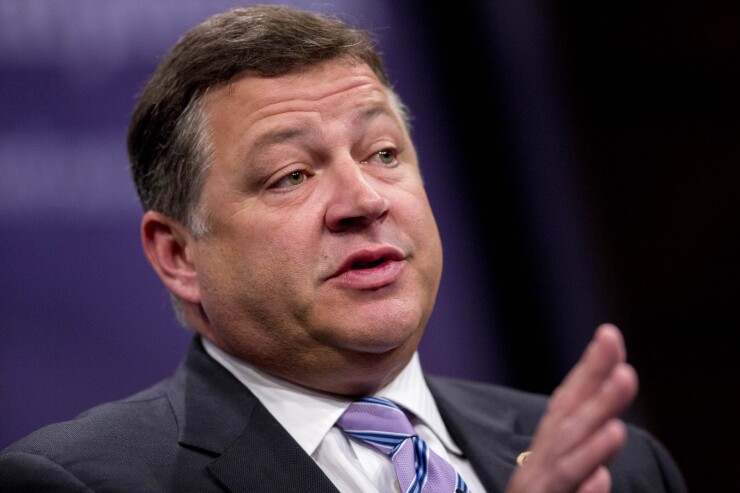WASHINGTON – House Transportation and Infrastructure Committee chairman Bill Shuster, R-Pa., raised the possibility on Wednesday that Congress could employ a “lame duck strategy” and vote for infrastructure legislation after the November mid-term elections.
He broached the idea during a speech at the American Association of State Highway and Transportation Officials’ annual Washington Briefing -- one day after Senate Majority Whip John Cornyn, R-Texas, told reporters that he didn’t know if there would be time this year to deal with infrastructure legislation.
“I don’t know what they’re doing over there,” Shuster quipped about the Senate.

Afterward, he told reporters that he is beginning to work with Rep. Peter DeFazio, D-Ore., the ranking minority member of the committee, on an infrastructure bill.
Shuster strongly suggested that the bill will propose an increase in the federal gas tax and said that President Trump, who told lawmakers he would support such a hike, will have to sell it to the public and, more importantly, to Republican leaders in Congress, and House Ways and Means Committee chairman Rep. Kevin Brady, R-Texas.
Asked by The Bond Buyer if the Shuster/DeFazio bill would contain a hike in the federal gas tax, Shuster noted that past transportation legislation has been funded with transfers from the nation’s general funds.
“We continue to back-fill with general money,” he said. During the last two transportation bills passed by Congress, he said, “We looked under every cushion [and] under the floor mats in the car to find every nickel we could to cobble together the money. There is no money out there.”
“We’ve got to get serious, we’ve got to look at this,” he said, “A conservative principle is: if you use something, you pay for something.”
Shuster said a vehicle miles traveled fee, which is still being studied, "is not ready for prime time," but should be looked at in the future when electric cars are more prevalent and kids that are used to being tracked through their IPhones are older. "I believe it's a generational thing," he said.
Sen. Tom Carper, D-Del., the ranking minority member of the Senate Environment and Public Works Committee who also spoke to AASHTO, said during a recent meeting with the President he proposed increasing the gas tax 4 cents per gallon per year for four years. But Trump said that wasn’t high enough or fast enough and proposed 25 cents per gallon in one year.
Shuster said to reporters, “The president says 25 cents. I’ve been talking about 15 cents – if you take 15 cents, that’s about $2 a week for the average American.”
That’s about two bottles of water on a half of a cup of Starbuck’s coffee, he added. “It’s really manageable for the American people.”
Shuster pointed out that 31 states have already raised their gas taxes and said, “There’s been no political pain, people haven’t been thrown out of office.”
“No one wants to raise taxes,” Shuster said. But the federal gas tax “is not like the other taxes you send to Washington. One hundred percent of what you pay at the pump, the user fee, goes into the [Highway Trust Fund] and 100% of it goes out to roads, bridges and transit.”
The issue is getting support from Republican leaders who are opposed to a hike in the federal gas tax, he said.
“The funding piece of [a bill], we can propose it, we can talk about it, which I intend to do. The Ways and Means Committee is really the committee that has to do it so we’ve got to figure out how to put pressure on them.”
“It’s going to take presidential leadership,” Shuster said, adding, The president needs to stand up every week” and promote an increase in the federal gas tax.
DeFazio also spoke to AASHTO and was very critical of President’s Trump infrastructure plan, which he noted contains no pay-fors. Administration officials have said they plan to pay for the plan by cutting AMTRAK and transit funds. DeFazio said Congress isn’t going to go along with that. “So there’s no money,” he said
“I’m in the position of, ‘Show me the money. There’s no sense in talking policy if there isn’t more money.’" he told AASHTO members. “If there’s no money, it’s not worth having the discussion” about an infrastructure bill.
Both DeFazio and Carper said that while Sen. John Barrasso, R-Wy. Chair of the Environment and Public Works Committee who also spoke to AASHTO, talked about the importance of reducing permitting delays, the last two transportation bills contained permitting reforms and most of them have never been put in place.
DeFazio said its “good news” that the President wants a 25 cent per gallon increase in the federal gas tax, which would fix the Highway Trust Fund.
But he noted that House Speaker Paul Ryan, R-Wis., House Majority Leader Kevin McCarthy, R-Calif., and Brady are opposed to any additional federal investment.
“Unless Trump makes a very strong case and pushes the Republicans, there will be no investment; hence there will have no bill. So that’s where we’re at.”
Shuster warned that inaction on the HTF is not an option. He noted that the HTF is expected to become insolvent in October 2020. That means that in the spring of that year state transportation and transit officials will have start halting projects and forego starting any new ones.
“And Republicans are the ones that are going to pay the price. So we have to do something now. We have to fix it.”





